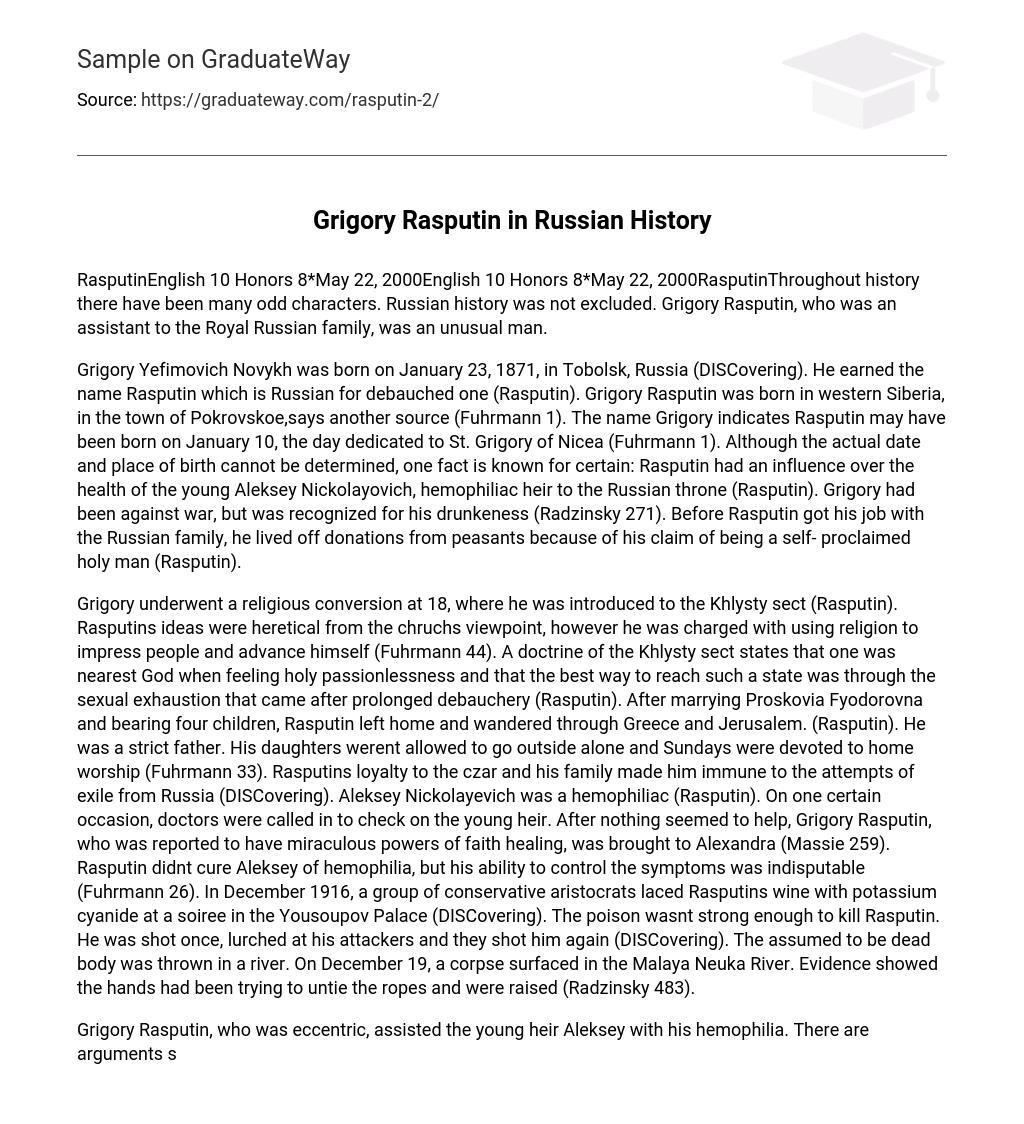Throughout history, there have been numerous peculiar characters, and Russian history was no exception. Grigory Rasputin, an assistant to the Royal Russian family, was a man of extraordinary nature.
Grigory Yefimovich Novykh, who was also known as Rasputin, was born on January 23, 1871, in Tobolsk, Russia (DISCovering). Another source states that Rasputin was born in the town of Pokrovskoe in western Siberia (Fuhrmann 1). Interestingly, the name Grigory suggests that he may have been born on January 10, which is the day dedicated to St. Grigory of Nicea (Fuhrmann 1).
While the exact date and location of birth remain uncertain, it is a known fact that Rasputin had a significant impact on the well-being of young Aleksey Nickolayovich, the hemophiliac heir to the Russian throne (Rasputin). Grigory was famously opposed to war, although he gained notoriety for his excessive drinking habits (Radzinsky 271). Prior to securing his position with the Russian royal family, Rasputin relied on donations from peasants due to his self-proclaimed status as a holy man (Rasputin).
Grigory was introduced to the Khlysty sect at the age of 18, which led to his religious conversion (Rasputin). Rasputin’s ideas were considered heretical by the church, yet he was accused of using religion to gain influence and further his own interests (Fuhrmann 44). The Khlysty sect believed that one could be closest to God by experiencing a state of holy passionlessness, which could be achieved through sexual exhaustion after prolonged debauchery (Rasputin).
After marrying Proskovia Fyodorovna and having four children, Rasputin travelled through Greece and Jerusalem. He was a strict father, not allowing his daughters to go outside alone and dedicating Sundays to home worship. Rasputin’s loyalty to the czar and his family protected him from being exiled from Russia.
Aleksey Nickolayevich, also known as Rasputin, suffered from hemophilia. When the young heir’s condition deteriorated and medical treatments proved ineffective, Grigory Rasputin, renowned for his powers of faith healing, was summoned to attend to Alexandra. Although Rasputin did not cure Aleksey’s hemophilia, he was able to manage the symptoms effectively. In December 1916, a clique of conservative aristocrats spiked Rasputin’s wine with potassium cyanide during a social gathering held at the Yousoupov Palace.
Despite the poison not being potent enough to successfully end Rasputin’s life, he withstood being shot once, lunged towards his assailants, and was consequently shot again (DISCovering). Subsequently, the supposedly lifeless body was disposed of in a river. Eventually, on December 19, a cadaver emerged from the Malaya Neuka River, displaying signs of attempts to untie ropes and raised hands (Radzinsky 483).
Grigory Rasputin, a controversial man, was known for his eccentricities and his assistance to young heir Aleksey in dealing with his hemophilia. There are debates about Rasputin’s birthplace and time. Additionally, Rasputin established his own religious sect and miraculously survived two gunshot wounds before eventually passing away.
Works Cited
- Discovering Biography. The Gale Group. 9 May 2000 .
- Fuhrmann, Joseph T. Rasputin, A Life. New York: Praeger Publishers, 1990.
- Massie, Robert K. The Romanovs: The Final Chapter. New York: Random House,1995.
- Radzinsky, Edvard. The Rasputin File. New York: Nan A. Talese, 2000.
- Rasputin, Grigory Yefimovich. Encyclopedia Britannica Online. 9 May 2000 http://search.eb.com/bol/topic?eu=64340&sctn=1.





